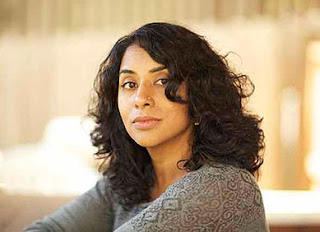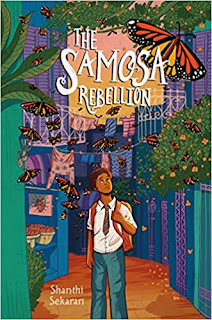Shanthi Sekaran is the author of The Samosa Rebellion, a new middle grade novel for kids. Her other books include Lucky Boy, a novel for adults. Also a writer for television, she lives in Berkeley, California.
Q: What inspired you to write The Samosa Rebellion, and how did you create your character Muki?
A: I'd been thinking for a while about writing a children's book, having read so much kid lit to my own two sons.
I think The Samosa Rebellion, as a project, appealed to me at a very particular point in my creative life. Lucky Boy had been out for a couple of years, I was just recovering from a whirlwind 18 months of book events, and I was trying to start on an adult novel.
However, the labor of Lucky Boy was still weighing me down, creatively. Sometimes, as a writer, you have to sort of "forget" how much work actually goes into creating a novel. I still hadn't "forgotten" the amount of work that went into Lucky Boy and I think that was choking up my writing.
So I decided to try something totally different--a children's book. Muki's story appealed to me because it started very simply. It was just a story about a boy and his grandmother. And then, of course, it grew more complicated.
But it was very refreshing to write a story just for the sake of story, without thinking deliberately about context or critical voices or layers of meaning or artistic complexity.
Muki came to me as a boy very much like my own boys, and the circumstances of his schooling and his encounters with various challenges--the Schaedlers, the secret missions, danger, uncertainty--complexified his character.
I wanted his life to reflect my own experiences growing up with Indian immigrant parents. But most of all, I wanted to write a book that my kids would enjoy.
Q: The Kirkus Review of the book says, "Sekaran explains systemic racism and the dangers of demagoguery in clear and age-appropriate ways with evocative prose." What do you think of that description?
A: I was very careful in how I spoke about immigration, xenophobia, race and demagoguery in this book. I didn't want the language to be too heavy-handed--hence the butterfly/moth allegory--and I tried to explain thorny issues in the context of what a 12-year-old kid would notice and care about. It took many drafts to strike the right note.
In terms of the prose, I tried to keep myself entertained throughout. A writer friend of mine gave me a piece of advice for writing middle grade fiction: Try to put something surprising on every page--whether that's an idea, a turn of phrase, a word choice, an image, or an event. I took that advice as a challenge to myself, and it made the prose a lot of fun to write.
Q: Did you know how the novel would end before you started writing it, or did you make many changes along the way?
A: I wrote the final scene about midway through the first draft, so yes, I definitely had a vision for it. But some of the surrounding details only came to light as I worked my way through that first draft and the story built upon itself.
Q: What do you hope readers take away from the story?
A: More than anything, I hope readers find this story to be suspenseful, fun, funny, and memorable. I hope they'll remember the characters I came to love--even the not-so-nice ones.
And of course, I hope this book opens avenues for discussion of issues like race, class, and social change--issues that might otherwise be hard to approach with young readers. I hope this book starts conversations.
Q: What are you working on now?
A: I'm working on a second middle grade novel, something totally different from The Samosa Rebellion. This new book is about dance and time travel and ‘80s music. As part of my research, I've started taking ballet lessons myself, and I've been listening to ‘80s music almost nonstop for the past year!
Q: Anything else we should know?
A: Readers can order a signed copy of The Samosa Rebellion (signed by me, and personally inscribed to anyone you specify) from my local bookstore, Pegasus Books.
Just go to this link and order the book. Write "Autographed copy" in the comments section, plus the name you'd like the book signed to, and I'll pop over to the store and sign/inscribe it personally!
--Interview with Deborah Kalb. Here's a previous Q&A with Shanthi Sekaran.


No comments:
Post a Comment